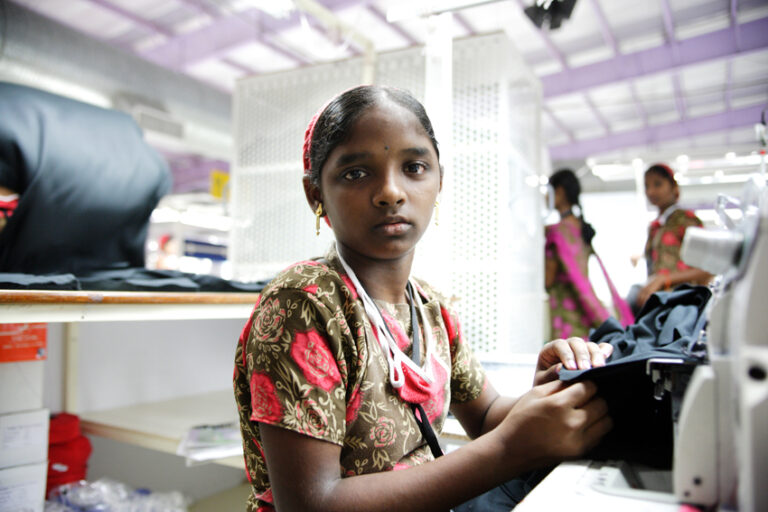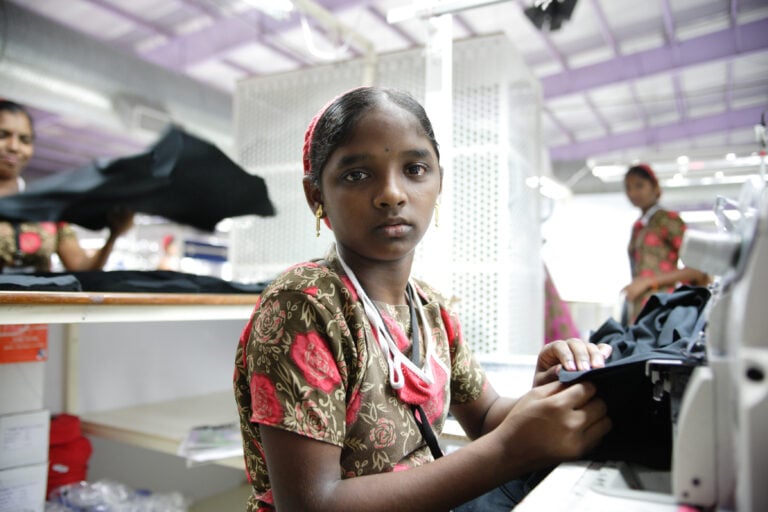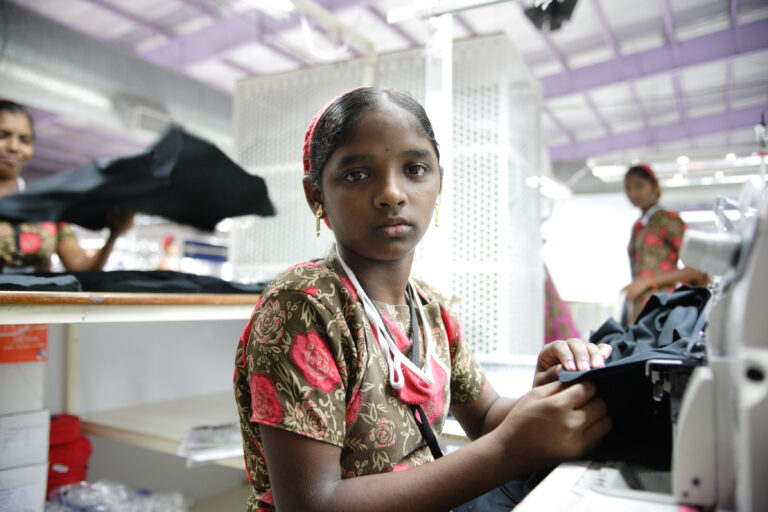Industry organisations’ action plan generates little action among garment companies
At thursday 30 October, the annual congress ‘Groen is de rode draad’ (Green is the red thread) by industry organisations Modint, InRetail and VGT took place. The industry organisations presented a status update of the action plan for sustainability in the Dutch textile and garment supply chains. This action plan aims to bring about structural improvements in working conditions in the sector. A number of thematic working groups have been set up to facilitate discussion and implementation by the members of these three industry organisations.
Dutch trade unions and NGOs, FNV, CNV, the India Committee of the Netherlands (ICN), Clean Clothes Campaign (CCC) and SOMO welcome the initiative, but point out that despite the ambitions of the industry, so far very little has been achieved. They are therefore calling on industry organisations to spur all their members into action.
Thousands of girls are working as ‘modern-day slaves’ in the South Indian textile industry, and a few dozen Dutch companies are producing garments using their yarn and fabrics. Just about a hundred companies support the action programme and a mere forty companies participate in one of the thematic working groups. Just one company is participating in the working group that focuses on the eradication of forced labour in the South Indian textile industry. Quite a disappointment, if you consider that the industry organisations jointly represent more than a thousand enterprises in the Netherlands.
Urgency
The Dutch trade unions and NGOs mentioned above are very concerned about the lack of progress and support in realising structural improvements. “After the Rana Plaza disaster in the garments industry in Bangladesh in April last year, the poor working conditions made the world headlines. Everyone was convinced of the need for a change of course. But 18 months after the Rana Plaza the feeling of urgency among companies seems to have petered out,” says Nazrul Islam Khan, chair of the confederation of workers unions IndustriALL Bangladesh Council.
Lilianne Ploumen, the Dutch foreign trade and development cooperation minister, underlined the urgent need for immediate action to tackle the industry’s problems and the life-threatening conditions that garment employees work in day-in day-out. She also insisted that the industry organisations should make sure that ‘workers notice the improvements in the workplace.’ To shape this transition, ten working groups have been set up in the framework of the action plan.
Transparency
In a resolution adopted in Parliament in April 2012, the Dutch government was asked to reach agreements with the garment industry on the issues of full supply-chain transparency and eradication of child labour and exploitation. The Parliament recently reiterated its request for supply-chain transparency and for active and visible efforts in improvement projects by each and every garment-sector company. Minister Ploumen endorses this request but has indicated that the calendar is as yet unclear. FNV, CNV, ICN, CCC and SOMO stress the need that the sector lays out specific goals and shows real progress.
According to the trade unions and NGOs, a voluntary commitment is no longer an option. Industry organisations should at the very least demand their member companies to map their supply chains, implement improvements and to publicly report about such measures. FNV, CNV, ICN, CCC and SOMO are strong supporters of binding agreements for the industry on specific goals and measurable results. Civil society organisations in production countries should be involved; transparency should be the norm; and complaints by victims of worker rights violations should be treated seriously and fairly.
Partners
Related content
-

-
 Expert meeting towards decent work in the Indian textile and garment industry and the role of the NetherlandsPosted in category:NewsPublished on:
Expert meeting towards decent work in the Indian textile and garment industry and the role of the NetherlandsPosted in category:NewsPublished on: -
 Flawed Fabric – The abuse of girls and women workers in the South Indian textile industryPosted in category:NewsPublished on:
Flawed Fabric – The abuse of girls and women workers in the South Indian textile industryPosted in category:NewsPublished on: -
Bonded (child) labour in the Indian garment industry Published on:
 Pauline OvereemPosted in category:Publication
Pauline OvereemPosted in category:Publication Pauline Overeem
Pauline Overeem
-
 Exploited Dalit Girls Produce Garments in India for European and US MarketsPosted in category:NewsPublished on:
Exploited Dalit Girls Produce Garments in India for European and US MarketsPosted in category:NewsPublished on: -
Indian garment companies try to silence Clean Clothes CampaignPosted in category:NewsPublished on:
-



